What to Know About Nikki Haley's Parents, Ajit Singh and Raj Kaur Randhawa
Nikki Haley's parents, Ajit Singh Randhawa and Raj Kaur Randhawa, immigrated to the United States from India
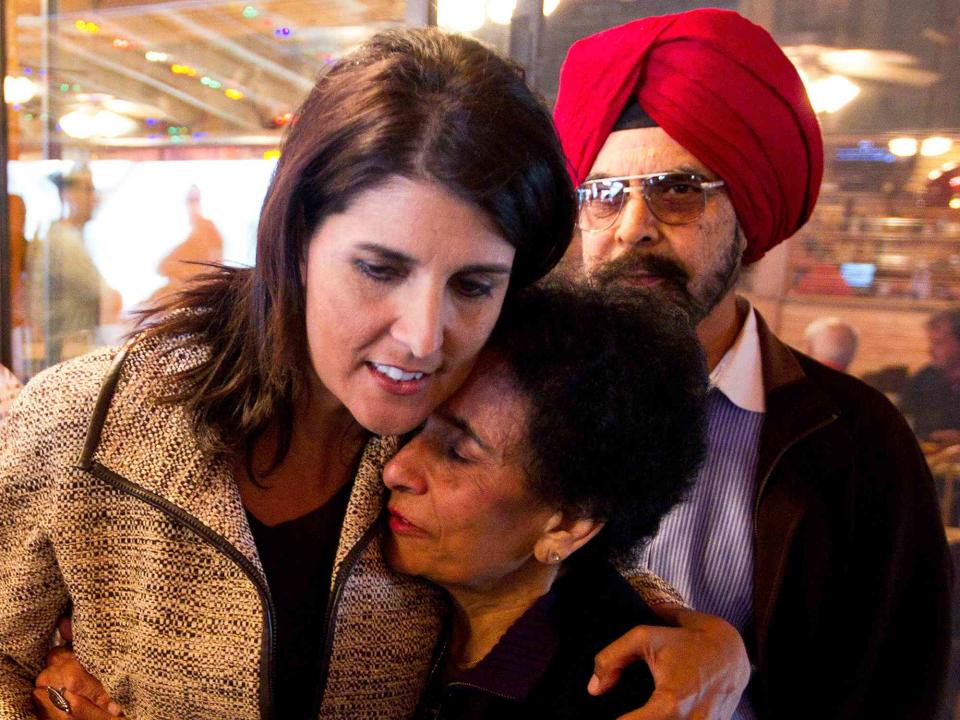
Chris Keane/Getty
Nikki Haley with her mom Raj Randhawa and dad Ajit Singh Randhawa after speaking to voters at Hudson's Smokehouse on November 3, 2010 in Lexington, South Carolina.Nikki Haley made her parents, Ajit Singh and Raj Kaur Randhawa, a central part of her campaign messaging in her run for the 2024 Republican presidential nomination before she suspended her efforts and dropped out of the race.
"I am the proud daughter of Indian parents who reminded me everyday how blessed we were to live in this country," the former governor of South Carolina wrote in her 2012 memoir Can't Is Not An Option. It's a refrain she has often repeated since, including in her CNN town hall on Jan. 18, 2024, when she told the crowd, "My parents always told me that, even on our worst day, we are blessed to live in America."
Haley's parents were both born to wealthy families in India before leaving their native country, first for Canada, then to South Carolina, where Haley was born and raised — and where she raised her own children, daughter Rena and son Nalin Haley.
Haley described Ajit and Raj as "more American than anyone [she] knew" thanks to their grit and the sacrifices they made to give her and her siblings a better life and more opportunities in the United States than they'd had in India.
However, as a politician, Haley has been tough on immigration and border policies, saying during one 2023 debate that the undocumented immigrants who arrived during Biden's presidency "have to go back."
"And the reason you send them back, the reason you send them back is because, my parents, they came here legally," she added, per The New York Times.
In a post on X (formerly Twitter), Haley shared that her dad died on June 16, 2024, which also happened to be Father's Day.
"This morning I had to say goodbye to the smartest, sweetest, kindest, most decent man I have ever known," she wrote. "My heart is heavy knowing he is gone. He taught his kids the importance of faith, hard work, and grace. He was an amazing husband of 64 years, a loving grandfather and great grandfather, and the best father to his four children. He was such a blessing to all of us."
Here's everything to know about Nikki Haley's parents, Ajit Singh and Raj Kaur Randhawa.
Her mother was raised wealthy, but still lacked some opportunities
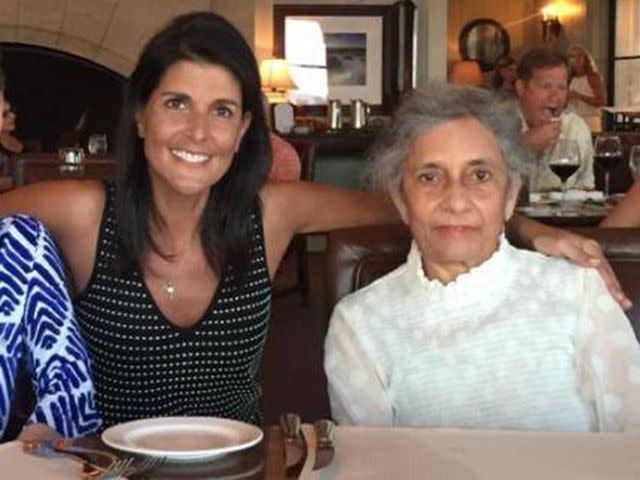
Nikki Haley Facebook
Nikki Haley and her mom Raj Kaur Randhawa.Haley's mother, Raj Kaur Randhawa, was born in the Punjab region of India. In her memoir Can't Is Not An Option, Haley wrote that Raj grew up in a six-story home close to the Golden Temple, the holiest site in the Sikh religion. Her father (Haley's grandfather) died when Raj was young.
Raj's family was wealthy, and Raj's mother had Raj's clothing custom-made and hired servants to carry her books to school and attend to basically every need she had within the household. Raj graduated from law school at the University of New Delhi, but wasn't able to make the most of her education in India.
"When you didn't have a lot of education in India, my mother actually was able to go to law school," Haley said in a March 2017 speech. "She was actually put up to be one of the first female judges in India, but because of the situation with women, she wasn't allowed to sit on the bench. But how amazing for her to watch her daughter become governor of South Carolina and US ambassador to the United Nations."
In her memoir, Haley wrote that Raj couldn't accept the role of a sitting judge because her family "didn't think it was appropriate."
Her father was largely raised by his extended family

LOGAN CYRUS/AFP/Getty
Nikki Haley embraces her father Ajit Singh Randhawa during a campaign event to launch her presidential bid on February 15, 2023 in Charleston, South Carolina.Ajit Singh Randhawa was born in the Punjab region of India, the son of a commanding officer in the British colonial army. Because Ajit's father moved so often for his military role, Ajit lived with his uncle for most of his early life, Haley wrote in Can't Is Not An Option.
She added that she listened "with incomprehension" when her father told her stories about only seeing his own parents for two months every year during his summer vacations from school.
Her father earned a master's degree in biology in India from Punjab Agricultural University. When he wanted to continue his education, she wrote, he opted for foreign degrees, which were generally preferred in India at the time. He earned his PhD from the University of British Columbia in Vancouver.
Her parents had an arranged marriage — but with a unique twist
Raj and Ajit had an arranged marriage through their parents, but in a rarity, they'd actually met before the arrangement happened. In Can't Is Not An Option, Haley says that her parents crossed paths when both their families were vacationing in the mountain area of Dharamsala, India, with her mom recalling that Ajit was a "good-looking man."
Raj and Ajit's parents arranged a wedding for them, and they ended up being compatible. They both came from wealthy families and were highly educated.
Her parents immigrated to Canada before settling in the United States
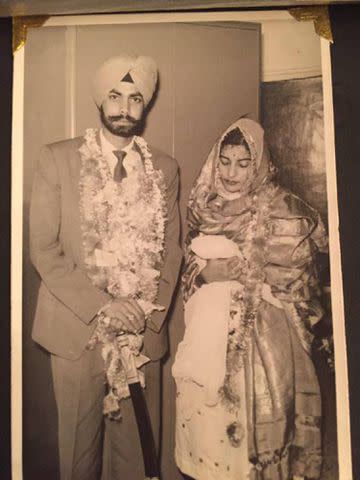
Nikki Haley Facebook
Ajit Singh Randhawa and Raj Kaur Randhawa.In 1964, Haley's father left India for Vancouver, British Columbia, Canada, where he studied for his PhD. A year later, Ajit sent for Raj and their family to join him, and Haley said it was a culture shock for her mother, who had to cook, clean and raise her children for the first time without hired help.
Raj began working three jobs to support the family while her father earned his doctorate, Haley wrote in Can't Is Not An Option, working as an aide for a child with special needs, at the post office and selling cosmetics to make ends meet.
Haley's father graduated from his PhD program in 1969, but didn't have many work prospects. He debated going back to India, Haley recalled to The New York Times Magazine in 2011, until a family friend found a job for her mother in South Carolina.
"They came to the U.S. to tour for a year. Right before they went back, someone said, 'You can’t leave; this is the best country,' and they said, 'We don’t have jobs,' " she said. "And by chance, my mom was offered a job to teach sixth-grade social studies, and my dad was offered one to become a professor. It happened to be in Bamberg, so that’s where they stayed."
Raj eventually left teaching to open her own boutique in Bamburg.
Her parents are U.S. citizens and helped form her stance on immigration
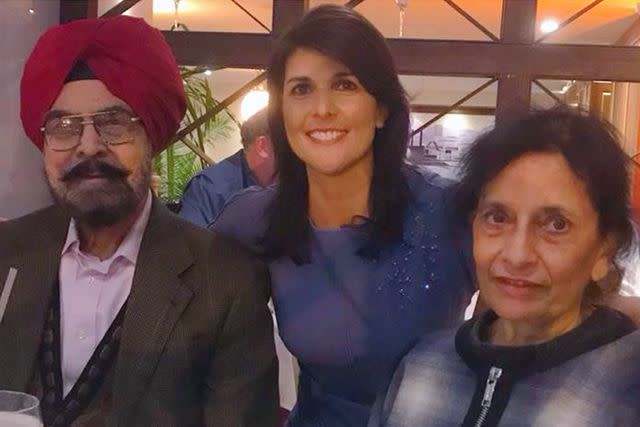
Nikki Haley Facebook
Nikki Haley and her parents, Ajit Singh Randhawa and Raj Kaur Randhawa.Haley was born Nimarata Nikki Randhawa in Bamberg, South Carolina, on Jan. 20, 1972. She's gone by her middle name, a Punjabi word for "little one," since childhood.
Haley is a United States citizen by birth, despite claims that she wasn't born in the U.S. and is ineligible to run for President. Her father became a U.S. citizen in 1978, while her mother was naturalized in 2003, according to the Associated Press.
Haley has said that her father helped instill her own patriotism, writing in Can't Is Not An Option, "He loves this country in the way that only a man who gave up a life of comfort and prestige elsewhere can."
While Haley has reminisced publicly on her parents' experiences as immigrants from India, she has been tough on immigration and border policies during her time in office in South Carolina, both as governor and in the South Carolina House of Representatives.
She supported Texas Gov. Greg Abbott in a post responding to his statement on what he called "Texas' constitutional right to self-defense" over disagreements with President Joe Biden's border control and immigration policies.
"Governor Abbott is right: the state of Texas has every right to defend itself and its borders," she wrote on X (formerly Twitter) in January 2024. "It’s absolutely ridiculous that Joe Biden is trying to stop governors from doing everything they can to protect their citizens. But it’s also nothing new; Biden was part of the administration that sued me when I passed one of the toughest anti-illegal immigration laws in the country as governor of South Carolina."
Haley also cites her parents as one of the reasons for her firm anti-immigration stance.
“Why are you letting them cut the line? My parents came here legally," she said at an Indianola, Iowa, campaign event, via The Washington Post. "They put in the time; they put in the price. They are completely offended by what’s happened. And my mom always said if they don’t follow the law to come to this country, they won’t follow the law when they get to this country.”
It echoes prior remarks she made: While Haley endorsed Marco Rubio in the 2016 Republican primary, she wrote in her 2019 book With All Due Respect: Defending America with Grit and Grace that her mother actually supported Donald Trump for the Republican nominee. When Haley confronted Raj about not standing by her choice, she said that Raj told her that "Trump was saying what needed to be said."
Haley added, "As a legal immigrant, she especially appreciated his views on immigration. She had strong feelings about people coming into the country the wrong way."
They faced discrimination and racism in South Carolina
In her memoir, Haley detailed the struggle her parents had when looking for a place to live in South Carolina when they were first getting settled in the United States. Haley said no one would rent to her parents, in part because they were foreign-born and in part because her father was a professor at a "Black school" — the HBCU Voorhees College in Denmark, South Carolina.
They had to buy a home instead, landing on a property in Bamberg, South Carolina, and Haley said even that came with conditions: They weren't allowed to host Black people in the house, they weren't permitted to have alcohol in the home and if they ever wanted to sell the property, they had to sell it to the people who originally sold it to them.
In Can't Is Not An Option, Haley recalled her family not fitting in in any part of their town because they were neither Black nor White, incurring stares, whispers and remarks everywhere from a local fruit stand to a pageant in which she and her sister competed as kids. "That difference — our difference — was an inescapable fact," she wrote. "We coped the only way we knew how: We went into survival mode."
The politician wrote that her upbringing was a tight-knit one in part because of the discrimination they faced, and she, her parents and siblings kept one another close and were respectful of all of their neighbors to try to avoid any problems.
They're practicing Sikhs
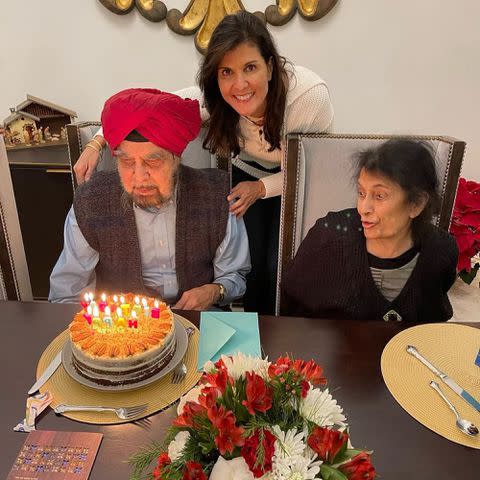
Nikki Haley Facebook
Nikki Haley and her parents Ajit Singh Randhawa and Raj Kaur Randhawa.Her parents were both devout Sikhs, and their religion was sometimes disrespected or dismissed in their early days in Bamberg, South Carolina, with people often knocking on the door of the family home in an effort to convert the family to Christianity. While they remained Sikh, Haley's parents exposed her and her siblings to various faiths and services, celebrated Christmas and even had her read the Bible.
"When I was growing up, they always said, 'There’s many ways of getting to God, and the important thing is that you have God in your life,' ” Haley wrote in Can't Is Not An Option, noting that her father still wears his hair in a turban.
Haley converted to Christianity when she married husband Michael in 1996. She told The New York Times Magazine that she and her parents didn't discuss religion often, but noted, "they have been very respectful."
They were "swatted"
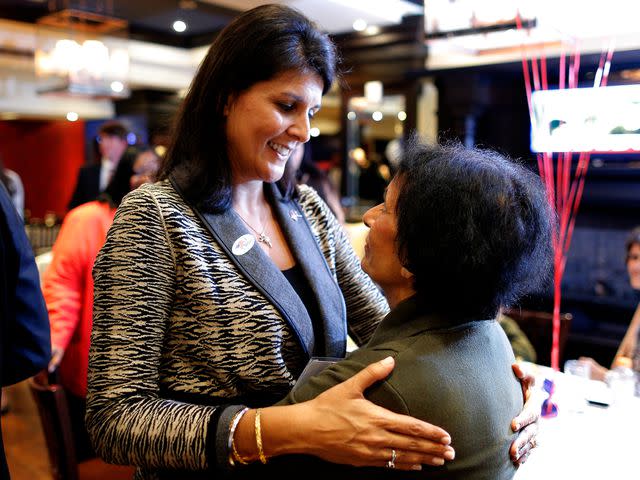
Stephen B. Morton/AP
Nikki Haley is congratulated by her mother, Raj Randhawa, at campaign headquarters on Nov. 4, 2014 in Columbia, S.C.On Dec. 30, 2023, Haley's parents were the victim of a "swatting" hoax at her home in Kiawah Island, South Carolina, she revealed on Meet the Press on Jan. 28.
Haley said Raj and Ajit, who had cancer at the time, were home with a caregiver when police arrived at the residence with guns drawn. According to Reuters, someone called authorities to falsely report that a man shot his girlfriend and threatened to harm himself at the property.
“I will tell you that the last thing you want is to see multiple law enforcement officials with guns drawn pointing at my parents and thinking that something happened,” Haley said on Meet the Press. “It was an awful situation.”
Her father worried his appearance would make him a campaign liability
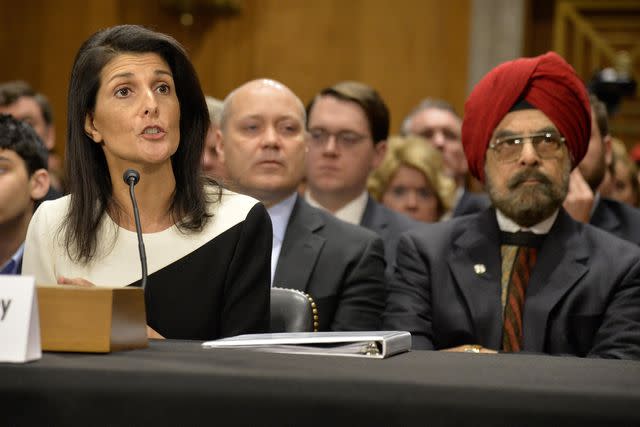
Mike Theiler/UPI/Almay
Nikki Haley makes remarks as her father Ajit Singh Randhawa listens during Senate Foreign Relations Committee confirmation hearings on Capitol Hill on January 18, 2017.While Haley couldn't be prouder of her father, who she described in Can't Is Not An Option as "honest and optimistic," she said he was concerned if he appeared with her publicly it may hurt her campaign chances in her political career, including her gubernatorial run in South Carolina.
Haley wrote that she noticed her father would often stand off in corners during her campaign events in her run for governor.
"I wanted everyone to see my parents and how proud I was of them," she wrote. "But I understood why he hid in the corner. He was always concerned that the fact that he looked different might hurt my chances in the campaign." While Haley did face racist remarks on the campaign trail, she said it didn't shake her desire to see her parents recognized for their sacrifices.
That changed when she won the 2010 governor race, and when she was inaugurated in January 2011, made sure the people who worked so hard to raise her shared her spotlight. On inauguration day, she wrote, the shining moment for her was seeing her parents in the front row of the platform, "right where they deserved to be."
For more People news, make sure to sign up for our newsletter!
Read the original article on People.

 Yahoo News
Yahoo News 
